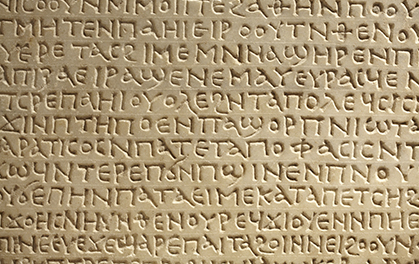CL123G Introduction to Greek Language and Culture

- Module Organiser:
- Dr Nicolette Pavlides
- Duration:
- Hilary term
- Contact Hours:
- 22 (11 x 2hr seminars)
- Weighting:
- 5 ECTS
- Assessment:
- 100% continuous assessment, consisting of brief written assignments during the term and a final assignment at the end of the module
Democracy and political debate, philosophy, theatre, art, architecture and virtually all forms of literature practised today have their origins in the Mediterranean world of Greece and Rome. It is the aim of this module to introduce students to the fundamental structures of the Greek language, and to some of the most important words (particularly those that have made their way into English) and the ideas they convey. We will be looking at the language of politics, family, war, love, death, justice, philosophy. We hope that when you complete this module you will want to learn more of the language.
Set Texts
Materials will be handed out in class. For students who would like to purchase a dictionary and/or grammar the following are recommended:
- Morwood, James, The Pocket Oxford Classical Greek Dictionary (OUP 2002)
- Morwood, James, Oxford Grammar of Classical Greek (OUP 2001)
Introductory Reading
- Jones, Peter, Learn Ancient Greek (Duckworth, 1998)
- Green, Tamara, The Greek and Latin Roots of English (Rowman & Littlefield, 2014)
- JACT, The World of Athens: An Introduction to Classical Athenian Culture (Cambridge 2008)
Learning Outcomes:
On successful conclusion of this module, students should be able to:
- Confidently read, pronounce and write words in the Greek alphabet and transcribe them into the Latin alphabet
- Recognise the most important morphological and syntactical structures of the ancient Greek language
- Recognise and give the meaning of a limited number of culturally important or very frequent words and roots
- Analyse the composition of common English words derived from Greek, identifying the relevant Greek words or roots and giving their meaning
- Recognise a number of key Greek cultural, intellectual, political and moral concepts and analyse how they differ from modern modes of thinking
- Recognise and explain the semantic and conceptual difficulties involved in interpreting and translating culturally specific Greek terms such as oikos, parrhesia, dike, sophrosyne, aidos, etc.
- Confidently use a Greek dictionary and grammar to interpret words, forms and syntactical structures
- Determine the general nature, content and key words of brief ancient Greek texts such as an inscription, a letter preserved on papyrus or a key passage in a philosophical treatise or the New Testament

